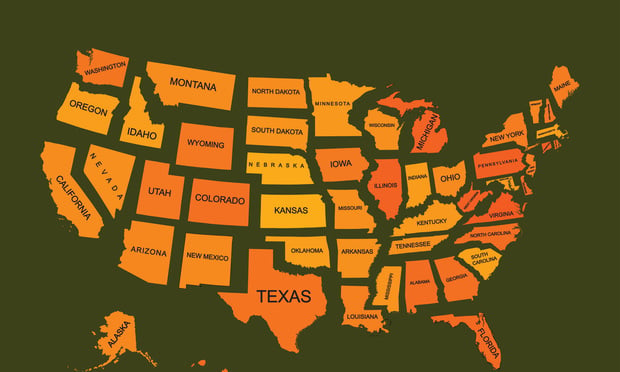
July 15, 2020 | Legaltech News
The People Problem: How States Try to Limit Risk Assessment Inaccuracies, MisusageDespite some assessment tools' sophistication, none can operate without some level of manual data collection, interpretation and input. How states ensure that is done accurately by court and correctional officials, however, often depends on a tool's complexity and the jurisdiction's preferences.
By Rhys Dipshan | Victoria Hudgins | Frank Ready
10 minute read

July 15, 2020 | Legaltech News
Who Validates States' Risk Assessment Tools? Here's a LookStates need to validate their risk assessment tool to ensure they accurately predict criminal justice outcomes in their jurisdiction. While some states will undertake validations themselves, others will turn to independent researchers, private and nonprofit organizations or universities.
By Rhys Dipshan | Victoria Hudgins | Frank Ready | Zach Warren
1 minute read

July 14, 2020 | Legaltech News
4 Ways COVID-19 Has (and Hasn't) Impacted International Data Privacy Laws' ImplementationAgainst the backdrop of a global pandemic, companies say dealing with a growing array of data privacy laws and COVID-19 is exhaustive. Here's the jurisdictions that have responded to those concerns with delayed implementation of their privacy regulations, and the governments that haven't budged.
By Victoria Hudgins
1 minute read

July 14, 2020 | Legaltech News
States vs. Vendors: Are Some Risk Assessment Tools Better Than Others?While some states would never consider a risk assessment tool created by third party, others say developing their own proprietary instruments is unnecessary and, given the resources required, unrealistic. Researchers are split on if state, vendor distinction even matters.
By Rhys Dipshan | Victoria Hudgins | Frank Ready
12 minute read

July 13, 2020 | Legaltech News
The Most Widely Used Risk Assessment Tool in Each U.S StateTools that have the broadest impact and deployment are ones that look at recidivism pretrial risk in adult populations. Here's a look the specific tools in use in each state, and the criminal justice decision points they influence.
By Rhys Dipshan | Victoria Hudgins | Frank Ready | Zach Warren
1 minute read

July 13, 2020 | Legaltech News
The United States of Risk Assessment: The Machines Influencing Criminal Justice DecisionsIn every state, assessment tools help courts decide certain cases or correctional officers determine the supervision and programming an offender receives. But the tools each state uses varies widely, and how they're put into practice varies even more.
By Rhys Dipshan | Victoria Hudgins | Frank Ready
11 minute read

July 08, 2020 | Legaltech News
Competition Where? ALSPs Are Baked Into Law Firms' New OfferingsOn the surface, more law firms offering advanced data analysis and consulting services are invading the alternative legal service provider (ALSP) market. However, firms are powering these endeavors with ALSPs' technology and resources.
By Victoria Hudgins
4 minute read

July 06, 2020 | Legaltech News
Big Tech's Wish List for National Facial Recognition LawTech companies want a national facial recognition law that balances consent and transparency. But keep Illinois' Biometric Information Privacy Act and its private right of action out of the discussion, they say.
By Victoria Hudgins | Dan Clark
4 minute read

July 02, 2020 | Legaltech News
Facial Recognition Bans Could Intensify Scrutiny Over Private Sector's TechSilicon Valley-based O'Melveny & Myers special counsel Scott Pink chats with Legaltech News about the impact of expanding local bans of facial recognition software and how a California bill could place a new burden on tech developers.
By Victoria Hudgins
5 minute read

July 01, 2020 | Legaltech News
Inside the Tech Helping Lawyers Combat Labor Abuse, Human TraffickingCertain technology is becoming essential to corporations looking to avoid reputational and regulatory risk, and prosecutors aiming to track evidence of human trafficking online.
By Victoria Hudgins
3 minute read
Trending Stories
- 1Restoring Trust in the Courts Starts in New York
- 2'Pull Back the Curtain': Ex-NFL Players Seek Discovery in Lawsuit Over League's Disability Plan
- 3Tensions Run High at Final Hearing Before Manhattan Congestion Pricing Takes Effect
- 4Improper Removal to Fed. Court Leads to $100K Bill for Blue Cross Blue Shield
- 5Michael Halpern, Beloved Key West Attorney, Dies at 72
More from ALM
- Scan In Progress: Litigators Leverage AI to Screen Prospective Jurors 1 minute read
- Legal Speak at General Counsel Conference East 2024: Match Group's Katie Dugan & Herrick's Carol Goodman 1 minute read
- Legal Speak at General Counsel Conference East 2024: Eric Wall, Executive VP, Syllo 1 minute read



